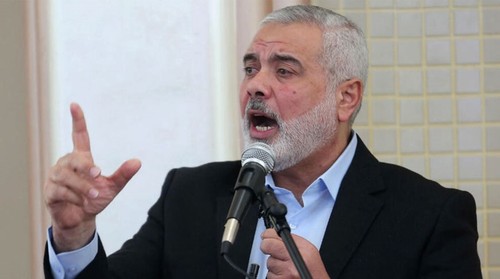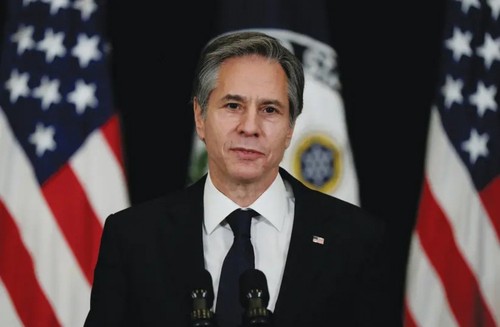 Political leader of the Hamas Islamist movement Ismail Haniyeh (Photo: France 24) Political leader of the Hamas Islamist movement Ismail Haniyeh (Photo: France 24) |
Political leader of the Hamas Islamist movement, Ismail Haniyeh, was assassinated in Tehran on Wednesday. A day earlier, Fuad Shukr, a senior leader of Hezbollah in Lebanon, was killed in an Israeli airstrike in the capital Beirut in retaliation for the deaths of 12 Israeli civilians by rocket fire in the Golan Heights on Sunday.
Intensified risk of full-scale confrontation between Iran and Israel
Haniyeh was killed while in Iran to attend the swearing-in ceremony of Iranian President Masoud Pezeshkian. Although the Israeli government has not claimed responsibility for the killing, observers say the assassination of Hamas's top political leader is a turning point.
This assassination has increased the risk of a direct confrontation between Israel and Iran. Immediately after Haniyeh’s death, Iran's Supreme Leader Khamenei and President Pezeshkian both announced strong retaliation against Israel.
Yossi Mekelberg, an analyst with Chatham House, said the Iranian government is forced to act if it wants to maintain its position and deterrence capability in the region. The question is how will Iran and its regional allies retaliate?
In retaliation for the attack on the Iranian embassy in Syria that killed several senior Iranian generals in April, Iran fired more than 300 missiles and unmanned aerial vehicles (UAVs) into Israeli territory. The attack was announced several days in advance and was calculated to avoid a direct conflict with Israel. Mekelberg says this time Iran’s retaliation is unpredictable.
He estimates a higher risk of drastic escalation this time because Israel and Hezbollah are also close to a full-scale fight.
US Secretary of State Antony Blinken said he cannot be sure of future security in the Middle East. “"It's urgent that all parties make the right choices in the days ahead, because those choices are the difference between staying on this path of violence, of insecurity, of suffering, or moving to something very different and much better for all parties concerned. I can't predict the effect, the impact of any one event on what comes next,” said Blinken.
The situation could draw Israel’s allies into the crisis. In the US, some hardline lawmakers have demanded that the government prepare a military intervention plan in case a large-scale conflict occurs between Israel and Iran and its allies.
 US Secretary of State Antony Blinken (Photo: Reuters) US Secretary of State Antony Blinken (Photo: Reuters) |
Is it an end to a ceasefire in Gaza?
The current spiral of violence has made it more difficult to reach a ceasefire and hostage exchange deal between Israel and Hamas. Negotiations between Israel and Hamas, mediated by Qatar, Egypt, and the United States, have been deadlocked for months and were only rekindled last week when officials resumed meeting in Cairo.
However, the assassination of Haniyeh could put an end to these efforts, said Sanam Vakil, Director of the Middle East and North Africa program at London’s Chatham House think tank. “The killing of Ismail Haniyeh will certainly damage ceasefire negotiations, when parties return to a period of extreme tension and uncertainty. I don't see any long-term solution in the near future," she said.
According to Vakil, Israel’s recent moves show that the Israeli administration is making important strategic changes, shifting its priorities to broader regional security challenges centering on Iran, instead of focusing on a ceasefire and hostage exchange with Hamas.
Israel’s shift will force other parties in the Middle East, including Israel's Western allies, to take a different approach.
Vakil said recent US attacks on pro-Iran militias in Iraq are a warning to those who want to escalate the conflict. US National Security Council spokesman John Kirby said on Thursday, “I don’t think an escalation is inevitable.” He added that the US is still trying to secure a ceasefire deal.